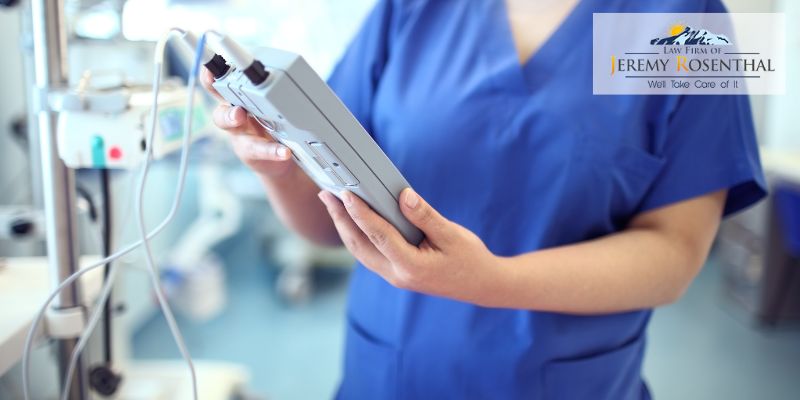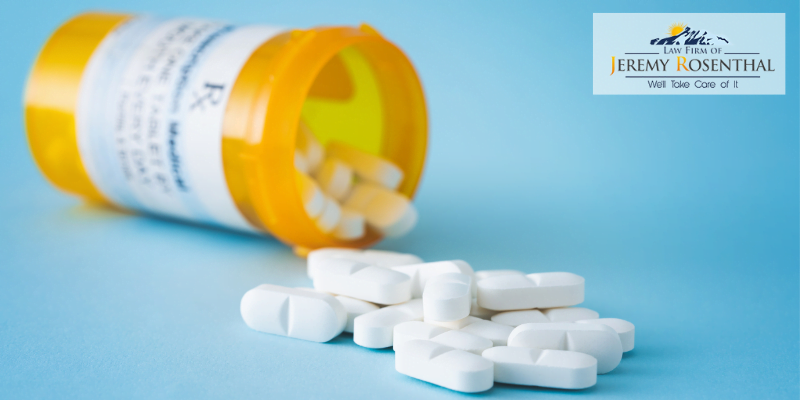Denver Defective Medical Device Attorney
Advancement in medical technology is a crucial element in saving the lives of patients who would otherwise suffer from irreversible medical ailments. Among those technological advancements are implantable medical devices. If you have suffered adverse health effects as a result of a faulty medical device, it is possible that you may be entitled to compensation. Consulting with an experienced and skilled Denver medical malpractice attorney is the first step to receiving the justice that you deserve. Since 2004, the Denver personal injury attorneys at the law firm of Jeremy Rosenthal has focused exclusively on personal injury law and makes it their priority to put your best interest first while supplying you with first class legal representation. Call (303) 825-2223 today to schedule a consultation.

How Is a Product Defective or Dangerous?
A product can qualify as dangerous if it poses significant or extraordinary risk to the end user through its intended use. Products can qualify as defective in any of three main ways.
- Defective production can involve an error or temporary issue with production processes. In defective drug cases, this could be an error during the chemical refinement process, dosage measurement, or problems with batches of raw materials. For example, a manufacturer may switch to a new raw material supplier that does not use the same quality standards as the previous one, causing defects in the next batches of drugs made with those materials.
- Defective design means an error in the original design of the product. A drug that is defective by design has some problem with the formula of the drug that renders it ineffective for its intended purpose and dangerous for anyone to use. For example, if a pharmaceutical company released a drug that appeared effective as intended but caused a side effect of increased cancer risk or another complication, this would be a defective design.
- Defective marketing occurs when a product manufacturer fails to accurately represent a product in advertisements and marketing materials. This may also apply to a failure to include adequate safety warnings or instructions for use. For example, if a pharmaceutical manufacturer markets a drug as a cancer treatment but the drug fails to live up to expectations set in their marketing materials, this would qualify as a marketing defect or possibly even false representation of a product.
How Do You Proving Negligence In a Denver Defective Medical Claim?
A product liability claim for a defective drug isn’t necessarily the same as a product liability claim for another type of consumer product like a household appliance or vehicle. Some products by their very nature are dangerous even with appropriate use, so determining liability for a consumer injury may be tricky.
However, it is not necessary to prove negligence in most product liability claims. The plaintiff’s attorney only has to prove that the product in question is defective and then offer evidence that links that defect to the plaintiff’s damages.
Due to the high duty of care that pharmaceutical manufacturers must meet, a case may require the manufacturer to prove that they were not negligent in the design, manufacturing, and marketing of a particular drug. Although the burden of proof typically rests on the accuser, the justice system recognizes that some manufacturers and other entities have a greater responsibility to ensure public health and safety and must therefore meet a higher standard of care in their work.
Individuals who suffer injuries and illness from defective drugs should also remember that liability may not fall to the manufacturer or solely to the manufacturer; every entity in the supply chain of the defective drug from production to end user sale could absorb liability.
For example, if a manufacturer released a perfectly safe drug but the company responsible for packaging the drugs used inappropriate or dangerous packing materials that somehow altered the drug’s properties, liability would likely fall to the entity responsible for packaging. If a pharmacist made an error dispensing the drug, the pharmacist would likely absorb liability for the plaintiff’s damages.
What are Defective Drugs?
Pharmaceutical manufacturers generally have a higher duty of care than most other product manufacturers due to the nature of their products. Some medications are safe even when taken by accident and may only result in minor negative symptoms, while other medications can be life threatening in certain circumstances. Additionally, some drug additives, preservatives, or inactive ingredients may cause adverse reactions in patients with certain health conditions.
Drug manufacturers must ensure a rigorous quality control process to prevent production errors. For example, if a manufacturer accidentally released a batch of medication with the wrong dosage strength or inaccurate dosage information, patients who take those medications could suffer an overdose. Some manufacturers may release ineffective medications that either fail to complete their marketed purpose or cause secondary medical complications.

What are Implantable Medical Devices?
Implantable medical devices are placed inside or on the surface of the body. Medical device implants can do a myriad of life saving and life changing functions like delivering medications, monitoring body functions, or providing support to organs and tissues.
Implants are made from a wide array of materials like metal, plastic, or ceramic. Most medical device implants must be placed by a trained medical physician. The length of time an implant is meant to be housed within the body can range from weeks to permanently. Examples of these medical devices include:
- Transvaginal Mesh
- Metal Hip Replacements
- Stents
- Defibrillators
- IVC Blood Clot Filter
- Da Vinci Surgical Robot
- Essure Birth Control
- Mirena
Who is Liable for a Defective Medical Device in Denver, CO?
Before a medical device can reach the marketplace, it must undergo approval from the Food and Drug Administration (FDA). The FDA is an agency within the United States Department of Health and Human Services that is tasked with protecting the public by validating the safety and quality of a long list of items ranging from food to medical devices. Medical devices regulated by the FDA include medical machines, contrivance, implant, in vitro reagent, or other similar or related items.
While medical devices must receive FDA approval prior to being sold and ultimately implanted, complications can arise and when they do, the FDA will monitor the severity and quantity of complaints to see if a device recall is warranted. A recall is meant to address a problem with a medical device that violates FDA law. Examples of medical device recalls include when a medical device is defective or when it could be a risk to the health of the public.
Contact a Denver Defective Medical Device Lawyer Today
When an implantable medical device causes a patient injury, it is possible that litigation by a Denver Defective Medical Device Attorney may be the only mechanism available to bring the patient justice. It is not uncommon for a patient to suffer extreme financial loss as a result of experiencing injury from a medical device. The patient may need to seek physical therapy or corrective surgery to fix the injury which can be financially draining. Litigation can help make the patient whole which attempting to force medical device manufacturers to improve their products so others are not similarly injured. Contact us today to schedule a free consultation.
